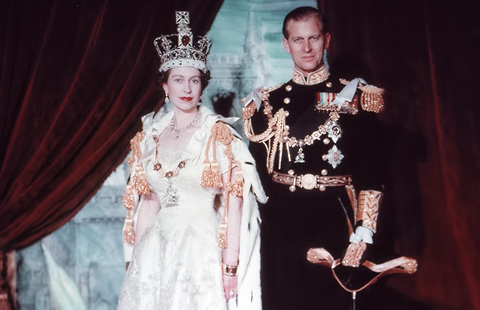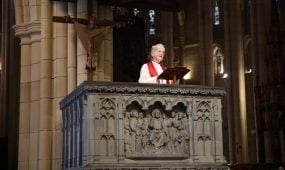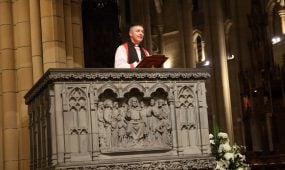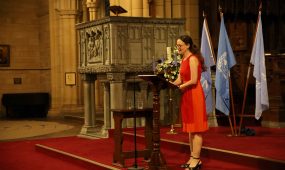Platinum Jubilee: 70th Anniversary of Accession to the Throne of Queen Elizabeth II
Homilies & Addresses
“In the Queen’s deep, personal, inclusive faith we catch a glimpse of the Spirit at work in the world to reconcile all people, of all faiths and none, to God and to each other,” says Archbishop Phillip Aspinall in this special St John’s Cathedral sermon

On 6 February 1952 King George VI died.
On the same day, while on royal duties in Kenya, Princess Elizabeth received the news that she was now Queen Elizabeth II. Tradition demands that the monarch accedes to the throne instantly. At no time is the realm without a monarch. The Queen was 25 years old.
And so this year we mark the 70th anniversary of the Queen’s accession; an occasion unique in the history of the British monarchy and the Commonwealth of Nations.
In a broadcast on her 21st birthday in 1947, the then Princess Elizabeth pledged to her subjects:
“My whole life, whether it be long or short, shall be devoted to your service.” On her accession that service began a new and unparalleled chapter. It has been as unstinting as it has indeed been long: now in her 97th year the Queen has devoted more than seven decades to the well-being of Britain and the wider Commonwealth.
Her reign has seen 14 Prime Ministers come and go, seven Archbishops of Canterbury and six Archbishops of York, a passing parade of world leaders and innumerable historic events: in turn triumphant, catastrophic, tragic. Through it all the Queen has evoked deep respect and profound gratitude from so many.
Out of that respect we are wary and hesitate to heap praise upon her. Her one-time bodyguard and keen observer of many events royal, Major General Alastair Bruce warns that:
“The last person who would want to be lauded is her. If you were to throw yourself into praising her, she would be uncomfortable. She is not one to have ever been remotely good at receiving, or is comfortable around, praise.” (Ashworth)
Advertisement
So rather than simply heap praise on the Queen, I invite you to discern with me the deeper, profound roots of this remarkable life.
One of the most evident marks of the Queen’s service has been humility. Graham Jones, former Bishop of Norwich, in which the Diocese Sandringham is located, refers to her “unforced humility which is…a grace or gift of the Spirit”. It is at the heart of the notion of service that has provided the entire framework for the Queen.
Major General Bruce attests to this quality:
“If you look at her in the footage of a grand service, she’s arriving – the trumpets sound out, and the grandeur of St Paul’s Cathedral and Wren’s glorious apses and arches are all around you – but she remains herself. There’s no change in her at all.”
And, his explanation is that:
“She knows she’s in the presence of something greater than herself, and that is projected in the way she handles all the splendour and grandeur that she has to embody – with the recognition that it is aimed at her but [is] not about her.”
Advertisement
Once, the Royal Maundy service was always conducted in the grandeur of Westminster Abbey. The Queen, however, recognising the spiritual import of it, took the service to the people in a journey around the realm. One observer notes the service itself “is an extraordinary spiritual service. The whole thing is humility personified: the white vestments, the washing of the feet. That is the Queen all over – humility. That principle underlies everything.”
This remarkable humility seems to manifest what Our Lord refers to in the passage we heard read from Luke’s gospel. In contrast to the kings of the Gentiles who lord it over their subjects, says Jesus, it is not so with you. “I am among you as one who serves.” (Luke 22.25, 27b).
The Queen has been described as having “an old-fashioned English reserve in matters of religion. But because people don’t talk too much about their personal faith, it doesn’t mean that it isn’t real: rather, that it is too deep for words.”
Many have been struck by the almost palpable presence of the holy on significant occasions in the Queen’s life: it was remarked upon by some present during the anointing by the Archbishop of Canterbury at her Coronation in the Abbey; and again when she solemnly receives communion publicly every five years at the inaugural service for the Church of England General Synod. Observers intuit, they feel, transcendence in these moments.
In her 2021 Christmas broadcast the Queen explicitly declared her deep personal faith when she said:
“It is this simplicity of the Christmas story that makes it so universally appealing, simple happenings that formed the starting point of the life of Jesus – a man whose teachings have been handed down from generation to generation, and have been the bedrock of my faith…His birth marked a new beginning.”
Major General Bruce explains what is so winsome about this:
“The understated way in which the Queen speaks of her faith is one with which nobody can find offence – it does explain why she is the sort of person she is. We admire her because we sense this is a person unspoiled by position, power, money…She seems to have become more popular the more unfashionable the Christian faith has become and the more she speaks of it.”
While the Queen may have spoken more explicitly about her faith in recent years, it has been there since the beginning. In her very first Christmas broadcast following her accession, but before the coronation, the Queen said:
“I want to ask you all, whatever your religion may be, to pray for me on that [coronation] day, to pray that God may give me wisdom and strength to carry out the solemn promises I shall be making and that I may faithfully serve him and you, all the days of my life.”
Notice how inclusive her invitation is: I ask you all…whatever your faith…60 years later the Queen expounded on the breadth of her vision when she addressed the leaders of world faiths at Lambeth Palace in 2012:
“She described the concept of the Established Church as ‘occasionally misunderstood, and I believe, commonly under-appreciated. Its role is not to defend Anglicanism to the exclusion of other religions. Instead, the Church has a duty to protect the free practice of all faiths in this country…Gently and assuredly, the Church of England has created an environment for other faith communities – and, indeed, people of no faith – to live freely…the Church has helped to build a better society – more and more in active co-operation for the common good with those of other faiths.’”
This underlying vision, emanating from deep personal Christian faith, has endeared the Queen to culturally and religiously diverse communities around the globe. It is what has led to the evolution of the old post-colonial Empire Day services into the multi-faith, multi-lingual, multi-cultural services we now see on Commonwealth Day.
Today, then, we are not simply swept away by the endless fascination with things royal, still less titillated by gossip, scandal or speculation that seem to distract so many.
Rather today we are moved by something that transcends time and space, something that is eternal, which we have been privileged to glimpse in the character of the Queen’s 70 year reign.
In her life of service, humility, faith and steadfast resolve we do indeed discern reflections of the character of God.
The Queen’s unshakeable, steadfast, resolute service, through whatever comes, mirrors for us the God who will never abandon us come what may.
In the Queen’s self-effacing humility we see reflected the Christ prepared to lay down his life that we might have life in abundance; we see the Christ who finds life by losing his own.
In the Queen’s deep, personal, inclusive faith we catch a glimpse of the Spirit at work in the world to reconcile all people, of all faiths and none, to God and to each other.
The Queen’s life resonates with and reflects to us these marks of transcendence, eternity, truth. For that wonderful life and gift to us all, thanks be to God.
Quotations from:
Pat Ashworth. 27 May 2022. ‘Platinum Jubilee: Advocate, not defender of the faith.’ Church Times.






